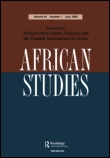
AFRICAN STUDIES
Scope & Guideline
Shaping Contemporary Debates on African Perspectives
Introduction
Aims and Scopes
- Cultural Studies and Identity:
The journal focuses on the exploration of cultural practices, identities, and representations in Africa, examining how these elements influence and reflect broader social dynamics. - Political and Historical Analysis:
Research often delves into the political histories and contemporary governance issues within African nations, analyzing the impact of colonialism, nationalism, and modern-day politics. - Gender and Sexuality Studies:
There is a consistent emphasis on gender and sexuality, investigating how these constructs affect individual and collective identities, particularly in relation to power structures and societal norms. - Urban Studies and Social Change:
The journal addresses urbanization and its effects on social structures, including issues related to migration, informal economies, and community dynamics. - Environmental and Economic Perspectives:
Studies also encompass the intersection of environmental issues and economic practices, particularly how local communities manage resources and respond to ecological challenges.
Trending and Emerging
- Decolonization and Post-Colonial Discourse:
There is a growing focus on decolonization, examining how historical legacies impact contemporary cultural and political landscapes, especially in relation to identity and representation. - Diaspora and Transnationalism:
Research increasingly addresses the complexities of diaspora experiences and transnational identities, reflecting on how migration shapes cultural exchanges and social dynamics. - Youth Activism and Social Movements:
The journal is witnessing a rise in studies related to youth activism, particularly in the context of movements like #EndSARS, which highlight the role of young people in shaping political discourse. - Intersectionality in Gender Studies:
Emerging themes emphasize intersectionality, exploring how various identities (race, class, gender) intersect to influence experiences and power relations in African societies. - Media and Digital Culture:
There is an increasing exploration of media ownership, digital culture, and the implications for power relations in contemporary African societies, particularly in light of technological advancements.
Declining or Waning
- Traditional Authority Studies:
Research focused on traditional authority and its role in governance has seen a decline, possibly due to the increasing interest in modern governance models and local adaptations to global influences. - Historical Narratives of Pre-Colonial Africa:
There has been less emphasis on pre-colonial historical narratives, as contemporary issues and post-colonial perspectives take precedence in current research. - Rural Studies and Agriculture:
Topics related to rural studies and agricultural practices are less frequently addressed, suggesting a potential shift towards urban-centric research themes.
Similar Journals
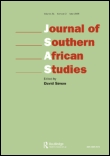
JOURNAL OF SOUTHERN AFRICAN STUDIES
Illuminating the Complexities of Southern African StudiesThe JOURNAL OF SOUTHERN AFRICAN STUDIES, published by Routledge Journals, Taylor & Francis Ltd, is a premier scholarly outlet dedicated to the exploration and analysis of social, political, and cultural dynamics affecting the Southern African region. With an established history since 1974, this journal features articles that contribute significantly to various disciplines, including Arts and Humanities, Sociology, and Geography, and is recognized within its fields as evidenced by its Q2 and Q3 quartile rankings in the latest assessments. Offering a rich academic platform for researchers, professionals, and students, it fosters interdisciplinary approaches and welcomes critical discourse on contemporary issues, ensuring relevance and impact in today's rapidly changing socio-political landscape. Notably, the journal has achieved commendable rankings on Scopus, affirming its standing as an influential source of knowledge. Although not open access, it remains a vital resource for those seeking to deepen their understanding of Southern Africa and its global implications.

African and Asian Studies
Unveiling Historical Narratives Across ContinentsAfrican and Asian Studies, published by BRILL, is a pivotal interdisciplinary journal that delves into the historical, social, and cultural dynamics of Africa and Asia. With an ISSN of 1569-2094 and an E-ISSN of 1569-2108, the journal serves as a vital platform for scholars and practitioners eager to understand the complexities of these regions. Notable for its historical convergence since its inception in 1966, African and Asian Studies has evolved to encompass a wide range of topics within the disciplines of history, sociology, and political science, highlighting its significance in contemporary research as reflected by its Scopus rankings, notably in the 70th percentile for Arts and Humanities - History. While not an Open Access journal, it offers invaluable insights and rigorous analyses that elevate the discourse surrounding development issues and sociopolitical contexts in Africa and Asia. Its commitment to fostering academic exchange is essential for researchers, professionals, and students dedicated to exploring these vibrant regions.

European Journal of Korean Studies
Bridging Cultures Through Academic ExplorationEuropean Journal of Korean Studies, ISSN 2631-4134, is a prestigious publication dedicated to advancing the field of Korean studies, published by the British Association of Korean Studies. Since its inception in 2017, this journal has provided a vital platform for scholarly discourse, focusing broadly on the cultural, social, and historical aspects of Korea and its global influence. While it currently holds an H-index focus, its inclusion in the Q3 category for Arts and Humanities and Q4 for Social Sciences demonstrates a growing recognition within academic circles. Researchers can expect to engage with a diverse array of interdisciplinary studies, reflective of the journal's commitment to fostering insightful analyses and discussions. Operating primarily from the United Kingdom, the journal encourages submissions that explore new methodologies and perspectives to enrich the understanding of Korean society. With an open access model pending, it aims to disseminate knowledge widely, making it an essential resource for academics, professionals, and students alike, interested in the intricate narratives of Korea's past and present.
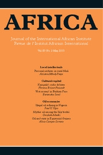
AFRICA
Exploring the Rich Tapestry of African CulturesAFRICA is a premier journal published by Cambridge University Press, dedicated to advancing scholarly research and discourse within the realms of Anthropology, Arts and Humanities, and Geography. Established in 1928, this journal has demonstrated an unwavering commitment to excellence, consistently achieving Q1 status in its respective fields as of 2023, demonstrating its impact and prestige in the academic community. With Scopus rankings highlighting it among the top 80th percentile in Social Sciences and 72nd percentile in Arts and Humanities, AFRICA serves as a vital resource for researchers, professionals, and students seeking to explore the complexities of African societies and cultures. The journal promotes a multidisciplinary approach, encouraging contributions that address contemporary challenges and opportunities within Africa. Although access is not open, AFRICA remains an essential asset for anyone aiming to deepen their understanding of the continent's diverse narratives and dynamics, publishing high-quality, peer-reviewed articles that shape the future of African studies.

Social Analysis
Charting New Territories in Social AnalysisSocial Analysis, an esteemed academic journal published by BERGHAHN JOURNALS, is at the forefront of interdisciplinary research, focusing on the dynamic intersections of anthropology, cultural studies, sociology, and the arts and humanities. Since its inception in 2002 and having transitioned to an Open Access model in 2020, the journal ensures that critical social research is widely accessible to scholars and the public alike. With an impressive Q1 ranking in Anthropology and cultural studies and holding a notable Q2 in Sociology and Political Science, it garners attention from a large academic audience, as evidenced by its high Scopus rankings: 10th in general arts and humanities and 153rd in cultural studies. This signifies its influential role in shaping contemporary discourse and providing a platform for innovative ideas and methodologies in understanding social phenomena. Based in Brooklyn, NY, the journal is dedicated to fostering scholarly dialogue and advancing the field, making it an essential resource for researchers, professionals, and students eager to engage with and contribute to the field of social analysis.
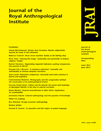
JOURNAL OF THE ROYAL ANTHROPOLOGICAL INSTITUTE
Advancing Anthropological Scholarship Since 1995JOURNAL OF THE ROYAL ANTHROPOLOGICAL INSTITUTE, published by Wiley, stands as a prestigious platform for scholarly discourse in the field of anthropology. With an ISSN of 1359-0987 and an E-ISSN of 1467-9655, this journal has been a vital resource for researchers, professionals, and students since its inception, featuring contributions that push the boundaries of understanding in both cultural and social anthropology. The journal’s rigorous peer-review process affirms its high academic standards, reflected in its top-tier Q1 rankings in both the Anthropology and Arts and Humanities categories for 2023. With a current ranking of #78 out of 502 in Social Sciences Anthropology and #138 out of 552 in Miscellaneous Arts and Humanities, it inhabits a critical space within academia, addressing seminal issues and innovative research. While the journal is not open access, it remains accessible to those affiliated with institutions that provide subscriptions, ensuring that groundbreaking anthropological insights are disseminated widely within the academic community. As it converges from 1995 to the present, the JOURNAL OF THE ROYAL ANTHROPOLOGICAL INSTITUTE continues to shape the landscape of anthropological research, engaging a diverse readership eager to explore the intricate tapestry of human cultures.
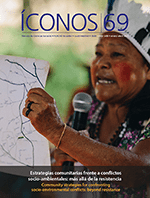
Iconos
Illuminating Latin American Perspectives on Social DynamicsIconos is a distinguished academic journal published by FAC LATINOAMERICANA CIENCIAS SOCIALES-FLACSO in Ecuador, with an ISSN of 1390-1249 and an E-ISSN of 1390-8065. Since its inception in 1997, Iconos has proudly maintained an open-access policy, promoting accessibility and dissemination of critical research across various disciplines. With a strong focus on Anthropology, Gender Studies, and Social Sciences, this journal has achieved a commendable standing, being categorized in the Q2 quartile in 2023 across multiple categories in these fields. Notably, it ranks #199 in Anthropology and #91 in Gender Studies, placing it in the upper percentiles of academic publishing. The journal aims to foster interdisciplinary dialogue and to illuminate socio-cultural dynamics through rigorous scholarship. With its commitment to quality, research diversity, and social relevance, Iconos serves as an essential resource for researchers, professionals, and students alike, seeking to engage with contemporary social issues from a Latin American perspective.
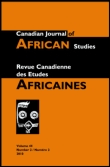
CANADIAN JOURNAL OF AFRICAN STUDIES
Championing Academic Excellence in African StudiesThe Canadian Journal of African Studies is a premier scholarly publication dedicated to the exploration and critical analysis of African cultures, societies, and histories. Founded in 1976 and published by Routledge Journals, Taylor & Francis Ltd, this journal serves as a vital platform for researchers, educators, and practitioners in various fields, including Anthropology, Cultural Studies, History, and Political Science. With its notable Scopus rankings, including a 96th percentile in History and a 89th percentile in Cultural Studies, the journal exemplifies academic excellence and influence within the social sciences. Although the journal does not currently offer open access options, it remains committed to providing high-quality research articles that contribute to the understanding of African issues in a global context. By addressing pressing social and political challenges, the Canadian Journal of African Studies not only serves academic interests but also fosters a deeper appreciation of Africa's diverse experiences and perspectives.

JOURNAL OF MODERN AFRICAN STUDIES
Fostering Understanding of Africa's Evolving NarrativesJOURNAL OF MODERN AFRICAN STUDIES, published by CAMBRIDGE UNIV PRESS, is a premier academic journal that has been a cornerstone for interdisciplinary research on contemporary issues facing Africa since its inception in 1963. With an ISSN of 0022-278X and an E-ISSN of 1469-7777, this journal plays a critical role in shaping the discourse around African studies, encompassing vital topics in Geography, Planning and Development and Sociology and Political Science. The journal holds a commendable Q2 quartile ranking in both fields, indicating its solid reputation and influence, with Scopus ranks reflecting its academic impact within the top echelons of social sciences. The journal’s commitment to quality scholarship aims to foster a deeper understanding of socio-political dynamics, cultural transformations, and economic developments across the continent. While it does not offer open access, its rigorous peer-review process ensures that contributions are impactful and relevant to researchers, professionals, and students alike. The JOURNAL OF MODERN AFRICAN STUDIES continues to be essential reading for anyone engaged in the ever-evolving narratives of modern Africa.
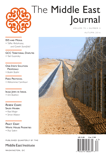
MIDDLE EAST JOURNAL
Connecting Research, Policy, and the Middle East's FutureThe Middle East Journal, published by the esteemed Middle East Institute, serves as a vital platform for scholarly discourse on the complexities of the Middle East, encompassing rich analyses in the fields of Sociology, Political Science, and Geography. With a legacy dating back to 1976, this journal continues to shape contemporary dialogues, offering rigorous research and insights that influence policy-making and academic studies alike. Academic readers will note its Scopus rankings, positioning it within the lower quartiles of Geography, Planning and Development and Sociology and Political Science, reflecting an opportunity for growth and increased visibility within these fields. Although the journal is not open access, it remains an essential resource for those aiming to enhance their understanding of the historical and current dynamics of the Middle East. The Middle East Journal stands as a testament to the region's complex socio-political landscape and offers a comprehensive lens for both established scholars and aspiring researchers.